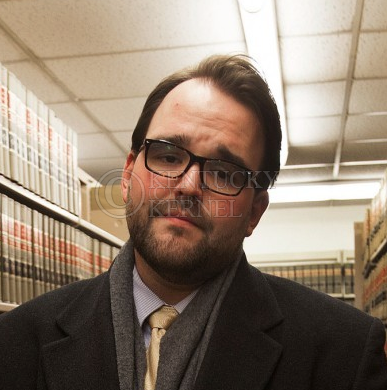Sex offender, UK law school grad denied bar exam
February 12, 2014
By Will Wright
A UK law school graduate will re-petition the Kentucky Supreme Court to review his bar exam application after being denied because he is listed on the state sex-offender registry.
The court ruled that Guy Hamilton-Smith cannot apply to take the bar examination until 2027 when he is scheduled to be removed from the registry.
Hamilton-Smith was charged with three counts of possession of child pornography in 2007 after his girlfriend at the time found images of child pornography on his computer and reported him to police.
Hamilton-Smith found the legal process that followed to be terrifying, but said he was glad to finally be honest with himself and those around him.
“When I came clean in the interrogation room, I felt free,” he said. “It put me on a whole different path for my life.”
He spent the next five years on probation, a sentence that could have been a lot more severe, Hamilton-Smith said.
“There’s a good chance if I was prosecuted federally that I would still be in prison,” he said.
Hamilton-Smith makes no excuses for his crime, but he said the sex-offender registry makes it too difficult for offenders to become productive members of society.
“If you’re not going to reintegrate them into society … then you’re building a recipe for re-offense,” Hamilton-Smith said. “The punishment has to have an endpoint.”
According to the Kentucky State Police website, unfortunately, many sex offenders do re-offend. However, a 2003 Department of Justice study found that of 10,000 sex offenders followed by the study, 5.3 percent of them were re-arrested for a sex crime in the three years after their release.
The Bureau of Justice Statistics found that of 272,111 persons released from prison in 1994, 67.5 percent were rearrested within three years.
UK political science professor Davida Isaacs said the registry makes it harder for sex offenders to find jobs, making them more likely to re-offend.
Though punishment is a key part of the rehabilitation process, Hamilton-Smith said, he still wanted to be a defense attorney.
“My plan for so long had been law school,” Hamilton-Smith said. “I wanted to fight for people who had nobody to fight for them. Now, I don’t know. I don’t know what the plan is.”
The UK law school application asks students if they have ever been convicted of a crime, said Danny Murphy, assistant dean of admissions and community engagement in the College of Law.
If the applicant has been convicted of a crime, the application says the person should consult the state’s examination board for the bar, as well as the state supreme court, early on to see if they would be eligible to take the exam, Murphy said.
Hamilton-Smith said he did consult the Kentucky Office of Bar Admissions in 2008 and was told there was a possibility he would not be accepted.
“Going in, I knew there was a risk,” he said. “I just decided I was going to see it through.”
Housing restrictions, Hamilton-Smith said, are the biggest problem with the registry. Finding a place to live can be hard by itself, he said, but when you can only look in specific areas and then must get the landlord to agree to give a convicted sex offender housing, it can be very difficult.
The Kentucky State Police website states that the registry is made to ensure public safety, not to punish or embarrass offenders.
“It’s about punishment, it’s about shame,” Hamilton-Smith said. “These are cases where bad facts make bad laws.”
The laws have good intention, he said, but most people do not realize that sex offenders rarely re-offend.
“Residence restrictions … tend to make the situation worse,” Hamilton-Smith said. “And it gives parents a false sense of security.”
There is an overriding public interest and need to ensure the safety of possible victims through the registry, according to the Kentucky State Police website.
“If you don’t give people a way to pay their debt to society then I don’t think that breeds anything good,” Hamilton-Smith said. “I think society pays for that in the end.”






























































































































































